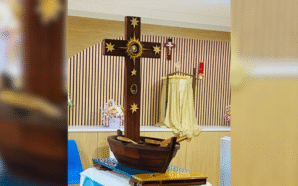Homily for Aboriginal and Torres Strait Islander Sunday
6 July 2025
Reconciliation Church
La Perouse
Readings: Isaiah 66:10-14; Psalm 66; Galatians 6:14-18; Luke 10:1-12, 17-20
Listen at soundcloud.com
In today’s gospel, Jesus sends the 72 on mission and tells them:
‘The harvest is abundant but the laborers are few; so ask the master of the harvest to send out laborers for his harvest. Go on your way; behold, I am sending you like lambs among wolves. Carry no money bag, no sack, no sandals; and greet no one along the way. Into whatever house you enter, first say, “Peace to this household.” If a peaceful person lives there, your peace will rest on them; but if not, it will return to you.’
We are all relieved that Patrick Dodson, the Father of Reconciliation, has regained his health to the extent that he is able to engage once again in the public square. He recently published his Reconciliation Memoirs in which he reflects on the loss of the Voice referendum. He says: ‘I believe every person who felt shattered and despondent at the referendum outcome should put that to one side. Traumatic as it is, it’s one vote, it’s not a judgment about reconciliation’.[1]
Having returned to the fray, Patrick says that one thing he wants to do is ‘work with young people rebelling against something. The Voice referendum has made them feel we’re failures because we didn’t deliver for them. We have to sustain their hope in being advocates and leaders in the challenges of life. They are important for this nation.’[2] It’s very appropriate that the theme of this year’s NAIDOC Week is The Next Generation: Strength, Vision & Legacy.
Speaking to all Australians, Patrick Dodson says: ‘Find common ground, don’t lose hope and engage, even in small ways, in the debate. We still lack a common narrative for the nation.’ When asked what that narrative should be, he answers: ‘That we acknowledge our foundations were built on non-truths or only partial truths, stories only from one side. The challenge now is that we need to rebuild on truths we understand more clearly, so we can share and therefore celebrate what we all hold in common.’[3]
Jesus goes on to tell the 72:
‘Whatever town you enter and they do not receive you, go out into the streets and say, “The dust of your town that clings to our feet, even that we shake off against you.” Yet know this: the kingdom of God is at hand. I tell you, it will be more tolerable for Sodom on that day than for that town.’
We are all reeling from the sentencing of the murderers of Cassius Turvey in the Supreme Court of Western Australia last week. When sentencing the offenders, the Chief Justice addressed them saying:
‘[A]t the time that the offences were committed on 13 October 2022, a number of you used racially charged language, referring to a number of the kids using racial slurs. You know what I mean by that: calling them ‘N-words’ and ‘black c’s’. You, in particular, Mr Brearley used language like that. So it is no surprise that when a group of non-Aboriginal adult men set upon a group of predominantly Aboriginal kids, using language like that, and one of those adults beats a boy so badly that it kills him, that the kids would think that they were being targeted because they were Aboriginal. And that the attack would create justifiable fear for them, and for the broader community, that this was a racially motivated attack. That fear is real and it is legitimate. By your actions, Mr Brearley, Mr Palmer and Mr Forth, you are responsible for that fear.’[4]
Mechelle Turvey, Cassius’s mother, said while the sentencing did not bring her closure, it was ‘a stepping stone today, it’s the start of something.’
The Chief Justice’s acknowledgment that the attack on Cassius would create ‘justifiable fear … that this was a racially motivated attack, gives us cause to reflect on racism in our society.
Last month, Roger Haight, a very fine American Jesuit theologian died. One of the last articles he wrote was on the social sin of racism in which he said:
‘Defining racism as a prejudicial understanding and behaviour toward other people because of perceived differences, I focus here on white prejudice against Black people. But I do not treat racism in the personal or subjective terms of one person or group despising another. I rather address cultural and social racism in its more objective forms.
‘Culturally, this refers to ideas, values, feelings and connotations that are contained in vocabulary learned in the processes of socialization from family, friends, schools and media. Socially, this objective perspective refers to patterns of behaviour in all spheres: in education, housing, work, religion, geographical location and politics. This racism subsists in the setup of society in which all participate. Thus, we can say that while the United States is not a society of racists, it is a racist society.’[5]
The same can be said of Australia. While we are not a society of racists, ours is still a racist society. Just ask the family and friends of Cassius Turvey.
There is a lot of talk going on about how we can best come to terms with our shared history so that we might move forward together as one nation under one Constitution. The novelist Kate Grenville who wrote The Secret River has now published a book length reflection on her pilgrimage from Sydney to Myall Creek. Her reflection is entitled Unsettled: A journey through time and place. She observes: ‘My family in this country goes back five generations, and for the first four of those generations, my forebears were on the sharp edge of the moving blade that was colonisation. With each generation, the frontier moved out from Ground Zero of Sydney, and every time it slid further out, my family was there.’[6]
Many of us come from families who were on either side of the sharp edge of that moving blade. Some of us come from families which were on both sides of that sharp edge of the moving blade. Others of us, the most recent migrants, were not on either side of the blade.
But whatever our family story, all of us need to reach the same end point as Kate Grenville who on arrival at the site of the Myall Creek Massacre writes: ‘There’s no way forward without acknowledging the things that were done…. To know them and to mourn, and to understand that we have to live with what we know. To accept that it’s part of who we are. To pick up our grief and sorrow and not look for somewhere to put it down as something that’s too heavy for us.’[7]
Grenville came away from the memorial at Myall Creek and concluded her pilgrimage with this reflection:
‘When you learn about the history of the last 200 years it seems impossible that we can ever go forward from the things that were done. Turning away can seem the only way to deal with them. This memorial is to remember something that feels too dark to look at. But it’s also a memorial to what can happen when the dark thing is brought into the light. Aboriginal and Balanda people came together, looked together at the truth of what took place, and together found a way to go forward. They’ve shown us that it’s not impossible. The rest of us can do it too.’[8]
Together, with the Lord’s grace, we can move forward together. Like Paul in his letter to the Galatians we can proclaim: ‘It does not matter if a person is circumcised or not; what matters is for each person to become an altogether new creature. Peace and mercy to all who follow this rule, who form the Israel of God. I want no more trouble from anybody after this; the marks on my body are those of Jesus. The grace of our Lord Jesus Christ be with your spirit, my brothers and sisters. Amen.’
Patrick Dodson’s Reconciliation Memoirs ends with him sitting beside his grandfather’s grave and reading the message on the headstone: ‘The sun rises, wind blows, grass grows, the tide comes and goes. No-one can ever take your land.’[9] May the coming generations find strength and vision through the legacy of their forbears.
Let all the earth cry out to God with joy.
The Lord has changed the sea into dry land;
through the river they passed on foot;
therefore let us rejoice in the Lord
who rules by might forever.
Let all the earth cry out to God with joy.
Fr Frank Brennan SJ is serving as part of a Jesuit team of priests working within a new configuration of the Toowong, St Lucia and Indooroopilly parishes in the Archdiocese of Brisbane. Frank Brennan SJ is Adjunct Professor of the Thomas More Law School at ACU and is a former CEO of Catholic Social Services Australia (CSSA). Fr Frank’s latest book is An Indigenous Voice to Parliament: Considering a Constitutional Bridge, Garratt Publishing, 2023 and his new book is ‘Lessons from Our Failure to Build a Constitutional Bridge in the 2023 Referendum’ (Connor Court, 2024).
[1] Reconciliation Memoirs with Patrick Dodson in conversation with Victoria Laurie, Reconciliation WA, 2025, p.45
[2] Ibid, 51.
[3] Ibid, 52.
[4] See https://ecourts.justice.wa.gov.au/eCourtsPortal/Decisions/DownloadDecision?id=655dba8c-5ff2-4684-b396-d7d7ca15e647, p.8.
[5] See https://www.americamagazine.org/faith/2024/10/31/ignatian-spirituality-racism-haight-248461
[6] Kate Grenville, Unsettled: A journey through time and place, Black Inc Books, 2025, p. 4.
[7] Ibid, 243.
[8] Ibid, 245.
[9] Dodson, p. 53.








